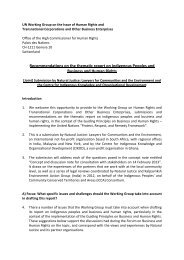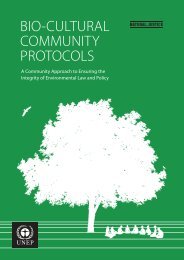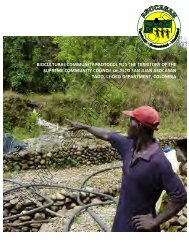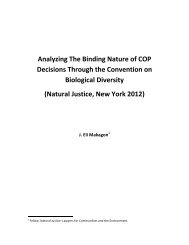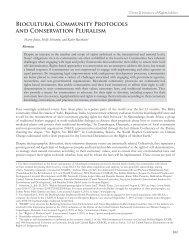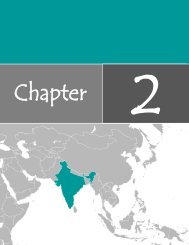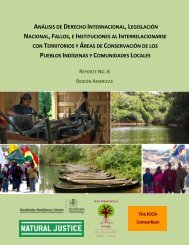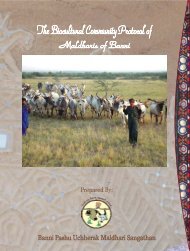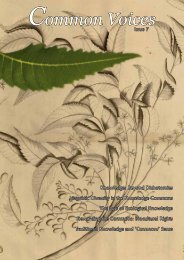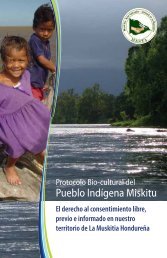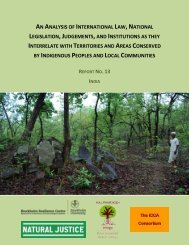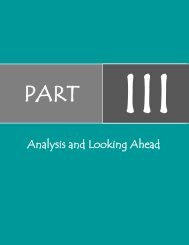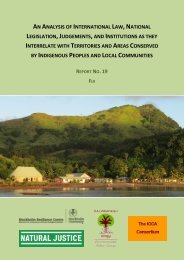illegal.In Senegal, the marine realm is excluded from the ambit of the 1996 decentralizationreforms, which has impeded local communities from gaining legal recognition of coastalICCAs. Nevertheless, some pioneering communities have been able to extend the acceptedpurview of the decentralization laws and were among the first in the country to have theirICCAs formally recognized. Foremost amongst these is Kawawana, in Casamance Province,which obtained the approval of the Provincial Governor and Regional Council as a coastalICCA. Despite this important local example, coastal ICCAs remain on questionable legalground and will require additional reforms to fisheries or to decentralization statutes toprovide coastal communities with clearer and more secure jurisdictional rights.e. Protected Areas Laws are Falling Behind International RightsThere have been important advances in international protected area law and policy over thepast 10 years, most notably, the Convention on Biological Diversity’s Programme of Work onProtected Areas (particularly Element 2 on governance, participation, equity, and benefitsharing). Some countries boast successful examples of shared governance and comanagementwith Indigenous peoples and local communities or of recognition of ICCAs.However, most governments are struggling to enshrine these international standards withinnational protected area laws and policies. Notwithstanding salutary examples, theestablishment, expansion, governance, and management of state and private protectedareas often conflict or overlap with the customary territories, areas and practices ofIndigenous peoples and local communities. Few countries’ protected area frameworksrecognize ICCAs or allow for devolution of governance to peoples or communities. In somethat do, there is often an inappropriate imposition of top-down designations, institutionalarrangements, or conservation requirements in order to fit them into existing stateprotected area frameworks. This undermines the diversity of ICCA arrangements and is asignificant risk to Indigenous peoples’ and local communities’ rights and ways of life.In formal protected areas that overlap with or subsume ICCAs, particularly those governedand managed by the state, Indigenous peoples and local communities generally bear adisproportionate amount of the costs and enjoy relatively few benefits other than menialemployment in tourism facilities or as guides or rangers. The establishment or expansion ofsuch protected areas is often a point of conflict with Indigenous peoples and localcommunities, particularly when the customary use of natural resources is prohibited andtraditional knowledge systems are ignored, including those of rural and Indigenous women.This atmosphere of legal uncertainty and often harsh enforcement of top-down rulesundermines customary systems of stewardship, governance and management. Thesubsequent deterioration of traditional knowledge and customary laws, coupled withpressures from growing populations and migrants, make these protected areas prone tounsustainable use of resources.Exclusionary ConservationEven in Panama, where Indigenous peoples’ territories have been recognized in the form ofComarcas, the law does not explicitly recognize or support the creation of communitygoverned protected areas. Indigenous peoples and local communities generally gain littledirect or immediate benefit from an area being declared protected, other than somepossible employment as guides or enforcement officers. In the majority of protected areas
the traditional use of natural resources isprohibited, which also has significantnegative impacts on the traditionalknowledge of the affected peoples. Thereare a number of ongoing disputes about thecreation of parks on ICCAs.Similarly, in Namibia, where provision hasbeen made for conservancies, neitherpolicies nor legislation recognize the landrights or basic human rights of people livingwithin state protected areas. There are nolegal provisions for involving people livingwithin or around the parks in planning,governance or management processes.Although many conservationists promote the strictprotection of major predators without the presence ofpeople, leopards and lions are also being conserved inICCAs in North Western Namibia. © Brian Jones3.4 Non-legal Recognition and Support of ICCAsRemains Absent, Weak, or InappropriateNotwithstanding a number of progressive measures in several countries that provide nonlegalrecognition and support to ICCAs, there remain significant gaps and weaknesses inmost countries.a. Administrative and Programmatic Recognition is Absent or WeakICCAs are often excluded from governmental programmes and schemes or figure only inmarginal terms, especially where they do not have legal recognition. Even national plans andprogrammes for biodiversity or wildlife conservation or sustainable use of biologicalresources often lack focus on ICCAs. Very seldom do poverty eradication or ruraldevelopment programmes consider ICCAs (or more generally the practices of Indigenouspeoples and local communities) as potentially effective ways of securing livelihoods,providing jobs, or in other ways achieving poverty- and development-related goals.b. Financial, Technical, and Developmental SupportLinked to the general lack of legal, administrative or programmatic recognition, manycountries do not have dedicated funds for or technical and developmental programmesoriented to the particular situations of Indigenous peoples and local communities or theirICCAs. Even where there are programmes for Indigenous peoples and local communities,they do not often support their own resource use and management traditions or institutions.Particularly weak is the provision of funding or technical support for activities such as legalempowerment, mapping and building capacity for reclaiming rights to and management oftraditional territories and areas. In several places where such support does exist, it can beinappropriate in imposing uniform and gender-insensitive institutional structures, overlyrestrictive rules and regulations, and conditions that end up undermining the autonomy anddiversity of local arrangements.



